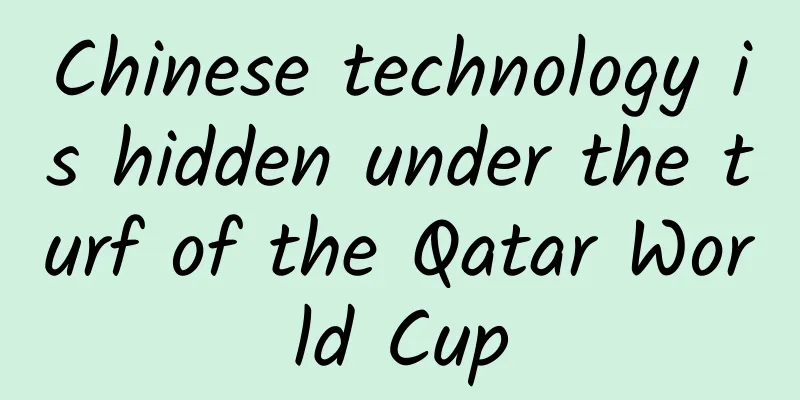Chinese technology is hidden under the turf of the Qatar World Cup

|
"How does it feel to kick?" On the evening of November 22, Beijing time, just after the opening match of the Qatar World Cup ended, Sun Zhaojun, former dean of the School of Resources and Environment and the Institute of Environmental Engineering of Ningxia University, hurriedly made a phone call. "It's pretty good. The on-site maintenance staff all said that the turf quality is very good, the grass is relatively low, and the ball speed is very fast." said the person on the other end of the phone. The green field where the players fought tenaciously was not only a competition of skills, but also a display of wisdom. It is the responsibility of science and technology workers to use Chinese technology to improve human welfare. In August 2020, with the support of the Ministry of Science and Technology and the Ningxia Science and Technology Department, Ningxia University, Qatar NAAAS Group, and Huaxin Guolian (Beijing) Enterprise Management Co., Ltd. signed a US$1.264 billion agreement to carry out the transfer of intelligent wind and solar complementary water-saving irrigation system equipment and related technical achievements in Qatar, and use them for the construction of landscaping, agricultural development and other projects. On the turf of Qatar, Cristiano Ronaldo and Messi are still the brightest stars. Facing the last piece of the puzzle on the two's honor roll, the Ningxia science and technology people couldn't help but shout: "Kick freely, and don't forget to speak for our turf!" Behind the turf Qatar, located on the southwest coast of the Persian Gulf, is surrounded by 550 kilometers of coastline, most of which is desert. The climate here is tropical desert, hot and dry, with an average annual precipitation of only 75.2 mm. April to October is summer, with the highest temperature reaching 50 degrees Celsius; winter is cool and dry, with the lowest temperature being 7 degrees Celsius. This is also the reason why this World Cup is held in winter in the northern hemisphere for the first time. Not all grasses are suitable for football pitches, let alone in Qatar. "Unlike ordinary green spaces, the maintenance and management of sports field lawns is quite special, and relevant measures need to be taken before and after the game." Dr. Deng Jianqiang, a lecturer at the College of Agriculture of Ningxia University, graduated from the College of Grassland Agriculture Science and Technology of Lanzhou University. He believes that in addition to weed control, lawn mowing and fertilization, the key link in winter sports field lawn maintenance is irrigation. The reason why it is critical is that the amount of irrigation must be sufficient, the penetration depth must reach 40 to 50 cm, and the shallowest must be more than 30 cm, so as to ensure the normal use of the lawn in winter. The warm-season turf used in this World Cup football stadium faces another problem - its growth rate slows down under drought and water shortage conditions, and some areas turn yellow, making irrigation a more difficult problem. According to the British newspaper The Guardian, in order to ensure that the quality of the pitch meets the requirements of the event, each pitch in Qatar needs to consume at least 10,000 liters of fresh water every day in winter. Paradoxically, there is a serious lack of fresh water resources here, and seawater desalination technology is highly dependent on fossil energy. Its neighbor Saudi Arabia has about 30 seawater desalination plants, which consume 300,000 barrels of crude oil every day. A small piece of grass has become an energy problem. While Qatar was worrying about its lawn, Sun Zhaojun, thousands of miles away, had led his team to complete the research and development of intelligent wind-solar complementary water-saving irrigation system equipment and related technologies, and promoted its application in northwest China and Arab countries, changing the passive situation in which the research and development of water-saving equipment in my country's arid and poor areas had long been in a state of "following" and relying on imports. This has to do with Sun Zhaojun's other two identities - Director of the Ministry of Education's China-Arab Joint Laboratory for International Cooperation on Characteristic Resources and Environmental Governance in Arid Areas, and Director of the Ningxia Key Laboratory of Resource Evaluation and Environmental Regulation in Arid Areas. The friendship between China and Arab countries has a long history and lasts forever. On June 5, 2014, President Xi Jinping proposed the important initiative of exploring the establishment of a China-Arab Technology Transfer Center at the Sixth Ministerial Conference of the China-Arab Cooperation Forum. The Ministry of Science and Technology responded positively, and Ningxia took the lead in striving to have the China-Arab Technology Transfer Center settled in Yinchuan. On September 10, 2015, the China-Arab States Expo opened grandly. Under the joint witness of the Ministry of Science and Technology, the People's Government of the Ningxia Hui Autonomous Region and the ministers of science and technology of eight Arab countries, the China-Arab Technology Transfer Center was unveiled. The Ningxia Science and Technology Department became the Chinese executive agency and undertook the construction and specific management of the Yinchuan headquarters. At the foot of the Helan Mountains, on the banks of the Yellow River, the melodious sound of camel bells has echoed along the ancient Silk Road for more than 2,000 years, and now it shines in another way. In 2016, Ningxia University cultivated a pulse irrigation lawn at Qaboos University in Oman. In response to the urgent need for water-saving technology and intelligent equipment in arid areas of Arab countries, the Ningxia Science and Technology Department established a special project for China-Arab scientific and technological cooperation and technology transfer in 2016 to support Ningxia University in implementing projects such as the "China-Arab Green Intelligent Water-Saving Equipment and Technology Demonstration Base Construction". It was from that year that the hard work of Sun Zhaojun's team went abroad. Sun Zhaojun's hometown, Haiyuan County, Zhongwei City, Ningxia, is a land of drought nine out of ten years. Seeing that "the land and water cannot support the people", he was determined to help his hometown solve the irrigation difficulties since he was a child. In 2010, he successfully developed an intelligent wind-solar complementary water-saving irrigation system and obtained a national patent. Two years later, Sun Zhaojun was selected to carry out scientific and technological poverty alleviation work in Dagouyan Village, Wangtuan Town, Tongxin County, Wuzhong City. Taking advantage of this opportunity, he proposed the idea of building a 100-acre water-saving irrigation demonstration area in the village. Due to the lack of water resources, Dagouyan Village has been struggling on the poverty line. Can water-saving irrigation be achieved on the dry plateau? For a time, villagers were very skeptical. In the early spring of the following year, Sun Zhaojun, He Jun, Han Lei and several other doctors braved strong winds of level 6 or 7 and went to the fields to install water-saving pipes and wind-solar complementary power generation equipment, and completed the construction of the demonstration area within one month. In the following years, they jointly promoted more than 10 dryland water-saving technology achievements with many units. Under the "two melons and celery crops a year" planting model, the local watermelon yield was more than 2,600 kilograms per mu, and celery was more than 2,000 kilograms per mu, with the per mu output value exceeding 10,000 yuan for the first time. The farmland that had been abandoned for many years was turned into high-yield land, which made Sun Zhaojun famous in the field of water-saving irrigation. Inspiration from the Rubber Factory "We are promoting three major technologies in Arab countries: infiltration irrigation, intelligent control, and solar power generation for water pumping." Sun Zhaojun told Science and Technology Daily that the turf of Qatar's football field uses infiltration irrigation technology. This technology is not new in Ningxia. As early as the end of 2009, when Sun Zhaojun and his research team were carrying out a saline-alkali land management project in a place called Xidatan in northern Ningxia, they considered applying infiltration irrigation technology. Drip irrigation is an irrigation method that drips water to the root zone of crops through pipes to provide them with water, while infiltration irrigation is an irrigation method that allows water to penetrate the soil evenly and controllably through pipes buried underground to provide water to crops. During the process of treating saline-alkali land, Sun Zhaojun found that traditional drip irrigation technology easily leads to an increase in salinity, so he suddenly had an idea: could the pipes be buried underground? Over the past few years, the team has been looking for suitable materials and has selected many, but none of them are ideal. In 2011, after graduating from Beijing Forestry University with a doctorate, Sun Zhaojun officially started working on this project. Earlier, some well-known universities in China were also researching infiltration irrigation technology, but they used composite materials. After a few years, they found that the cost was too high and there was no prospect for promotion, so they stopped doing it. This inspired Sun Zhaojun's fighting spirit: "Ningxia has a large area of desertification, and infiltration irrigation is a very applicable technology. Our local researchers must make it!" There is a rubber factory next to Ningxia University. Sun Zhaojun and his colleague Dong Liang would look for "inspiration" when they had nothing to do. The plug he used for mobile water-saving irrigation was made of cooked rubber. Cooked rubber is not easy to stick together during the production process and is easy to break into pieces, but it has good water permeability. One day, looking at the piles of waste tires, Sun Zhaojun suddenly discovered a "new world": this is a good thing that can be used for infiltration irrigation! With the booming development of the automobile industry, the amount of waste tires has increased sharply. Using them as raw materials to process high-temperature resistant and aging-resistant pipes has low cost and wide source, which is in line with the development trend of the modern circular economy. It only costs 10 yuan to buy a used tire, grind it into powder, add adhesive, make it into pipes and lay them on the ground. Five or six tires can guarantee the rubber pipes needed for one acre of land. All worries are solved. From theory to practice, we must reject idle fantasies and take real action. In the following two years, Sun Zhaojun and his team members began intensive processing tests. According to incomplete statistics, they conducted at least 300 tests. In 2015, the Ministry of Science and Technology approved Ningxia to take the lead in integrating national scientific and technological innovation elements and technical resources to build an efficient and pragmatic platform for China's technology transfer and innovation cooperation with Arab countries. Soon, this work was carried out in an orderly manner. In June, the Ningxia Science and Technology Department organized relevant experts to visit the UAE. As an authority in the field of water-saving irrigation, Sun Zhaojun took on the important task. In 2016, Sun Zhaojun's research team planted underground irrigation lawns in Dubai, UAE. He was not sure whether the successful infiltration irrigation technology and equipment promoted in Ningxia would also be applicable to Arab countries. However, the charm of scientific research is that it can infinitely expand the boundaries of human cognition and thus gain spiritual pleasure. In many cases, this pleasure exceeds the yearning for material life. Sun Zhaojun and doctoral students Han Lei, Qi Tuoye, Jiao Bingzhong and others took infiltration pipes made of ordinary materials produced by a southern company and buried them underground in a park in Dubai to conduct experiments. At this point, a problem arises. Under high temperature conditions, there was almost no grass growing in the test area, and the infiltration pipes exposed on the ground were crushed into pieces after being exposed to the sun. Sun Zhaojun pondered for several days on how to let the delicate melon seedlings enjoy the Ningxia infiltration irrigation technology, and finally came up with a solution. He and his colleagues found a flower pot, turned it upside down on the melon seedlings, cut open the shady side to allow for ventilation, and left the sunny side to block the sun. He put a fresh-keeping bag on the flower pot and then pressed it down with a heavy object. After four or five days of anxious waiting, some melon seedlings poked their heads out. After another 10 days, all the green buds appeared in the experimental field of less than two mu. "You don't know how happy I was at that time!" Many years later, when Sun Zhaojun recalled this scene, he still couldn't help laughing out loud. Later practice proved that this type of microporous fully infiltration pipe or water-outlet and non-water-out interval infiltration irrigation pipe has achieved a major breakthrough in solving the problems of biological blockage, ground evaporation, severe leakage, etc. in the continuous irrigation process of lawns and fruit trees. The water outlet spacing and water output are adjustable to meet the irrigation needs of different plants. In particular, the pipes made from waste tires through crushing, desulfurization, high-temperature synthesis and other processes have the characteristics of water saving, environmental protection, recyclability, anti-aging, and resistance to biological clogging. The service life can reach more than 10 years, which is very suitable for the high temperature and arid desert environment in Arab countries. Connect with "Beautiful Doha" China's infiltration irrigation technology has been successful in the UAE, which surprised everyone. "People in Dubai have never seen anything grow in such a hot day. They even suspected that I used some special preparations." Sun Zhaojun replied affirmatively, "The water source is yours, the melon seedlings are yours, and we rely on technology!" At that time, a large area of the local park was specially set aside for various countries to conduct irrigation experiments, such as Spain's infiltration irrigation. The land next to China also belongs to a country with strong water-saving irrigation capabilities, but there has been no movement in the land. It is said that they quietly withdrew after seeing the success of China's technology. The UAE has a different view of Chinese technology. In addition to writing a letter to the Ningxia Science and Technology Department to express its gratitude, it also invited the research team of Ningxia University to visit again. In 2018, professors from the Faculty of Agriculture at Qaboos University in Oman visited the experimental base to learn about underground irrigation technology. Sun Zhaojun (first from left) gave a detailed introduction. In May of the following year, Sun Zhaojun and his team successfully tested landscape and specialty cash crops. The two parties signed a technology transfer cooperation agreement for the demonstration and application of wind-solar complementary water-saving irrigation equipment in Dubai, with a total amount of 15.3 million yuan. Ningxia's agricultural water-saving technology has successfully gone abroad and demonstrated its prowess. It is not only the infiltration irrigation that has performed well, but also the integrated invention of three aspects. Farmland irrigation in my country and Arab countries is extensive, with high labor costs, low water resource utilization efficiency and intelligent control levels. Sun Zhaojun's team took the lead in completing the intelligentization of irrigation systems in extreme drought areas, and jointly developed a mobile app intelligent control system with enterprises. The equipment has the advantages of low cost, anti-interference, precise irrigation, and unmanned operation. In response to the problems of lack of outdoor power grid support and high cost of water pumping using fossil energy in the high-temperature and arid areas of Central and Arab countries, the project team proposed the idea of using wind and solar power generation variable frequency water pumps to pump water. Combined with intelligent control technology, they developed a complete set of high-temperature resistant wind-solar complementary water-lifting irrigation technology and equipment systems. The three-pronged approach has obvious advantages. Ningxia has done a good job in water-saving irrigation, and the news quickly spread in Arab countries. In Oman, Sun Zhaojun, He Jun, Li Qian and others independently developed intelligent control underground seepage pipes to fight against the enemy. It is said that they are competing with experts from Germany and Italy at Sultan Qaboos University. Oman put all the test fields together and cooperate with whoever has the best results. Ningxia University's infiltration irrigation technology has made oleander grow very well, and professors from Oman's Qaboos University came to observe. The original team from Ningxia University successfully planted lawns, lemons, cannas, watermelons, oleanders, etc. The survival rate and plant height were more than 21% higher than those planted by local drip irrigation. The oleander impressed Sun Zhaojun the most. "It grew very beautifully, with red flowers all over the ground. Local people came to our fields to take wedding photos," he said. With the support of the science and technology special project, in July 2017, Ningxia University signed a teaching and research cooperation agreement with the College of Agriculture and Oceanography of Qaboos University in Oman, jointly developing intelligent water-saving irrigation technology and equipment in arid areas, jointly building a joint water-saving irrigation laboratory, jointly applying for international cooperation projects, and jointly training undergraduate and graduate students; in September, Ningxia University signed a technology transfer cooperation agreement with Professor Abdul Ismaili of Qaboos University in Oman, with a total amount of 110.69 million yuan. Due to the good results in Oman and Dubai, Sun Zhaojun's team also applied for a national science and technology assistance project in Egypt. With the foundation of large-scale and multi-country demonstration and promotion in the early stage, the relevant departments of Qatar extended an "olive branch" to Ningxia University's water-saving irrigation technology. From January 12 to 14, 2020, Sun Zhaojun and He Jun were invited to Doha, Qatar to carry out scientific and technological exchanges and cooperation. During the period, relevant personnel accompanied them to inspect the 2022 World Cup greening project, local soil and vegetation, and held discussions. After listening to Sun Zhaojun's report entitled "Technical Achievements of Intelligent Water-Saving Irrigation in Arid Areas", the CEO of Qatar Free Trade Zone expressed the hope to introduce this technology and participate in the construction of the "Beautiful Doha" major project. At that time, the PE pipes used in Qatar aged very quickly and had to be replaced every two or three years. Moreover, the pipe walls were very thick and no water could escape when buried underground. Most importantly, the land to be greened was saline-alkali land, and they were helpless and had invited many experts to help but to no avail. This is precisely the strength of Ningxia University's scientific research team. Sun Zhaojun and He Jun went to Qatar to look at the land, prepare materials, and select a factory. The other party also went to Ningxia University to conduct an on-site inspection of the laboratory, and they developed a strong desire to cooperate with each other. Under the active promotion of the China-Arab Technology Transfer Center, on June 23, 2020, Ningxia University, Huaxin Guolian (Beijing) Enterprise Management Co., Ltd., and Qatar Free Zone Authority conducted in-depth online exchanges on the transformation and application of relevant technologies to support the "Beautiful Doha" water-saving and greening, food production, and ecological protection projects. On August 10, the tripartite agreement with a value of up to US$1.264 billion was officially signed. One month later, the China-Arab Technology Transfer Center and the Qatar Free Zone Authority reached a cooperation intention on cultivating and building the China-Arab Countries (Qatar) Technology Transfer Center. The spirit of the "Sasa Tree" The "Beautiful Doha" project lasts for 5 years, but in the more than two years since the signing of the contract, the new coronavirus pandemic has been raging around the world. What to do? Qatar’s greening period cannot be delayed during the World Cup, and we must go all out! The research team of Ningxia University, which was unable to be present on site, promptly commissioned an enterprise to carry out the construction in Qatar through technology transfer. They provided online technical guidance day and night, which made it possible for China's water-saving irrigation technology to make its debut during the Qatar World Cup. If conditions permit, we must go to school. If conditions do not permit, we must create them. This drive comes from the "Saxaul tree" spirit that Ningxia University has advocated for 64 years since its founding. In the northwest, the Elaeagnus angustifolia is a deciduous tree with strong vitality, which is drought-resistant, sand-resistant, salt-alkali-tolerant, and barren-tolerant. Inspired by it, the teachers and students of Ningbo University have formed the style of "not fearing difficulties, not fearing wind and cold, with deep roots and luxuriant leaves, and a solid foundation and flourishing branches". The best example is that scientific researchers travel thousands of miles to Arab countries to promote technology. Sun Zhaojun's team involves multiple departments of Ningxia University, including the School of Geographical Sciences and Planning, School of Ecology and Environment, School of Foreign Languages, and Arab Research Institute; there are 52 people in the two China-Arab Key Laboratories, of which more than 20 are young teachers and students of the university. "The test was carried out in June when the temperature is the highest. We had to observe the adaptability of the irrigation pipes under high temperature conditions." Sun Zhaojun recalled that one day the outdoor temperature was nearly 50 degrees Celsius. The young doctor Qi Tuoye had just stepped out of a taxi when he was "hit" back by the oncoming heat wave. Under such conditions, researchers wore thin sun-protective clothing and had to stay outdoors for more than 10 minutes. To prevent heat stroke, they poured mineral water on their heads while working. When they got on the bus, they were dripping from head to toe, and their clothes were tightly stuck to their bodies. By the time they returned home, everyone's skin was dark, and their faces and arms were sunburned. It is said that scientific research is bitter, but how can there be sweetness without bitterness? Teachers and students of Ningxia University gather hundreds of flowers and finally make honey. This technology has established two provincial and ministerial key laboratories in Ningxia, and two co-built laboratories in Oman and Egypt. In cooperation with Northwest Agriculture and Forestry University, Ningxia Water Science Institute and other units, six demonstration bases have been established in the arid areas of northwest my country, and seven demonstration bases have been established in Oman, Egypt, the United Arab Emirates, Qatar and other countries, forming the scale application results of key technologies and equipment for green, intelligent and efficient water conservation in the arid areas of China and Arab countries. The developed complete sets of equipment control an area of 2.4895 million mu, with a comprehensive water conservation of more than 21%. At present, the whole set of technologies has applied for 38 patents at home and abroad, including 19 invention patents and many utility model patents, and was selected as one of the ten main technologies promoted at the Third China-Arab Technology Transfer and Innovation Cooperation Conference. The team held 22 international academic seminars and training courses, and trained 2,764 people from 23 countries. "Ningxia's water-saving irrigation technology can provide high-quality services for the 'Belt and Road' construction, thanks to the strong support of the Ministry of Science and Technology and the Ningxia Science and Technology Department, and the concerted efforts of Ningxia University," said Huang Ying, director of the China-Arab Technology Transfer Center. In carrying out the national mission of promoting scientific and technological exchanges and cooperation between China and Arab countries, the center has successively built eight China-Arab technology transfer bilateral centers abroad in the Arab League, Saudi Arabia, the United Arab Emirates (Dubai), Jordan, Oman, Egypt, Morocco, and Sudan, built a comprehensive information service platform, held four China-Arab Technology Transfer and Innovation Cooperation Conferences, facilitated 88 cooperation agreements, and effectively promoted a number of advanced and applicable technologies and equipment in the fields of efficient water-saving irrigation, potato seed breeding and standardized planting, and satellite remote sensing monitoring to go abroad. The first China-Arab Summit held in Saudi Arabia in early December will inject more connotations into the China-Arab strategic partnership. In Huang Ying's words, "We firmly believe that the road of China-Arab scientific and technological exchanges and cooperation will be broader and the prospects will be brighter." In the production workshop of Ningxia Duoyuanxin Technology Co., Ltd. in Tongxin County, Wuzhong City, four production lines are running at full capacity to produce underground irrigation pipes. Two years ago, the three parties to the "China-Qatar Agreement" commissioned the company to start production and cooperated with many companies in Qatar and the UAE to apply it in the card organization. Sun Zhaojun, who just retired, has spent most of his time and energy here, providing technical design and guidance to enterprises. In his opinion, the water-saving industry in my country's western and Arab regions will continue to move forward, and the application prospects of green, low-cost and pollution-free products are broad. It will not only reduce dependence on traditional energy, but also drive the rise of related industries such as solar energy, wind energy and plastic pipe materials. Sun Zhaojun's team wants to make China's advanced technology benefit the world. With dreams as your horse, the galaxy is within your reach. Source: Science and Technology Daily Written by Science and Technology Daily reporter Wang Yingxia Planning丨Zhao Yingshu, Teng Jipu, Lin Lijun |
<<: Why do bacteria-like floating objects appear in front of your eyes when you look at things?
>>: Will the more coffee you drink, the sleepier you will feel?
Recommend
This is how advertisements will look good, here are the secrets to placing advertisements in the dating industry!
The threshold for entering the current marriage a...
China's cable TV users experience negative growth for the first time, as IPTV takes away users
The popularity of smart TVs and the technological...
How to promote on Xiaohongshu? Xiaohongshu promotion tips!
In fact, most of the Xiaohongshu merchants are mo...
There is no light in the deep sea, so the eyes of animals have degenerated? In fact, they are all masters of using light
There are many kinds of life on Earth, and the un...
How to safely get vitamin D from the sun?
Vitamin D is essential for our health. It helps m...
Do you want to pee as soon as you enter the swimming pool? ! How much urine is there in the swimming pool?
This summer, the heat is unbearable all over the ...
In addition to Jobs, what changes have Apple's press conferences undergone over the years?
At Apple's press conference this time, Apple ...
APP operation: How to improve user retention rate?
There is an important data indicator in the produ...
Offline marketing activities process and techniques!
A little background information – a large-scale e...
Jack Trading Academy JTA: BangJack Practical Trading ING
Jack Trading Academy JTA: BangJack Practical Trad...
What health issues should you pay attention to when riding shared bicycles?
As a product of the Internet O2O (online to offli...
The new Omicron variant is more contagious and has increased immune escape. What is the ultimate antidote?
Since the emergence of the novel coronavirus Omic...
The master teaches you how to make a high-end PPT. How to make a PPT cover page?
All 8 lessons have been completed, and the course...
In an age when metal and plastic are prevalent, what other options are there for mobile phones besides low-yield ceramics?
There are so many mobile phone launch conferences...
Can Win10 phones really run Android/iOS programs?
Can Windows 10 phones really run Android and iOS ...









